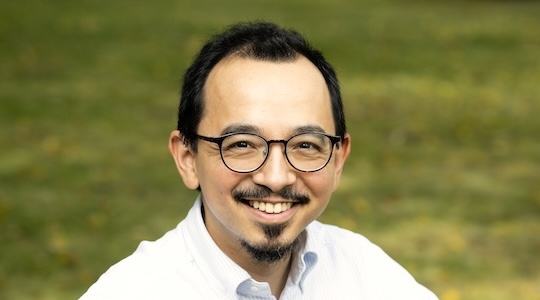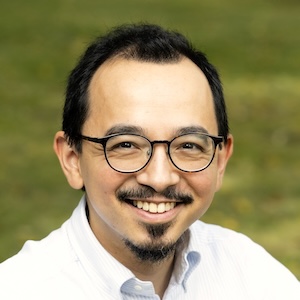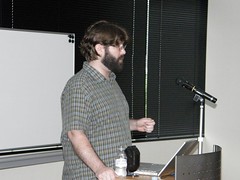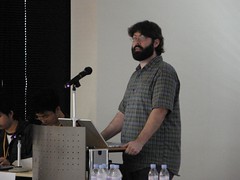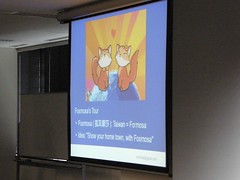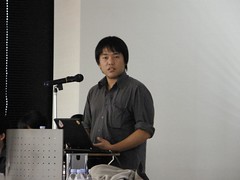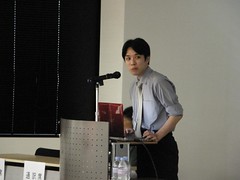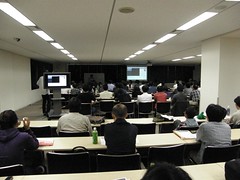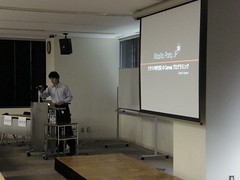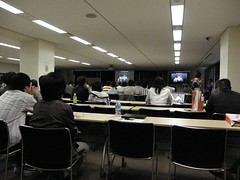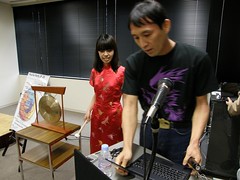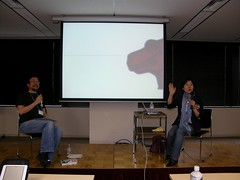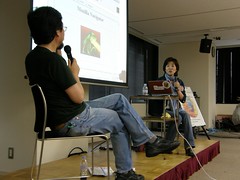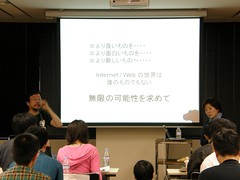Report from Mozilla Party JP 10!
On Saturday I went to Mozilla Party 10, a community event organized by Mozilla-gumi (もじら組). Mozilla-gumi has been an active community in Japan for the past 10 years, making it one of the oldest Mozilla communities around. Despite the cloudy weather in Shinjuku and the ever-present swine flu scare, we had over 100 people attending.1
Asa Dotzler: Firefox, Mozilla, Humans, and the Internet We Want
The first talk was by Asa Dotzler, Mozilla’s Director of Community Development, who was last in Japan seven years ago for the launch of Mozilla 1.0. Asa’s talk took us back to the history of the Internet and its great impact on all people. He reminded us that the values which built the successful internet of now are those of participation, transparency, interoperability—all of which are currently threatened by the forces of commerce. We must work together to balance the forces of commerce to prevent exclusivity.
Asa argues that the web browser—as the window through which we access the internet—has an important role to play in ensuring the open web. 23% of the world uses Firefox as its browser, spreading Mozilla’s non-commercial values with it. He retold the Netscape 7.0 popup-blocking fiasco as an example of commercial forces working against the public good.
While Firefox doesn’t have the great revenue stream of its competitors, what it does have is an impressive community, as demonstrated by the Mozilla gumi in Japan. There are over 1000 contributors to Firefox code—almost 10 times the number of actual employees—not to mention the thousands of daily testers who support this development. As we look forward to Firefox 3.5, it will support over 70 different languages, thanks to the great work of localization communities and organizers.
Asa argues that the key to Firefox’s success—and the success of the open web—is the involvement of users in its development. Firefox is a better product due to this community process, and he encourages users to get involved however they can to continue this success.
Bob Chao (趙柏強): Activities of the Taiwanese Mozilla Community
Bob Chao is the Community Liaison for the Taiwanese Mozilla Community, MozTW. As his day job, he works for Creative Commons Taiwan at Academica Sinica and is also affiliated with Dharma Drum University’s School of Philanthropy.
| Bob started off by remarking that the Taiwan is in many ways much like Japan: both use Kanji or Hànzi (漢字) for writing, both love baseball, and both have great senses of humor. Bob then gave a quick overview of the Taiwanese internet space. While there are no official numbers, Bob reports that Firefox has between 10-15% market share in Taiwan, and most are still using IE6. The most popular social networking service in Taiwan is not even on the HTTP web, but rather is [[Professional Technology Temple | PTT.CC]], a [[telnet]] service. For this reason, there are two Taiwanese Firefox extensions to add telnet support. Taiwan is also a leader in mobile technology and Bob is looking forward to Fennec, the upcoming Mozilla mobile browser. |
MozTW started in 2004 on the site moztw.org with hosting by the Open Source Software Foundation of Academica Sinica. MozTW now hosts a number of forums, wiki, and a planet as well as the popular Mozilla Links news blog. Some of their off-line activities include:
- Firefox Parties for major version releases,
- A “Firefox month” campaign for Firefox 2, including a tour of talks at different college campuses,
- Their own local Firefox mascot, Foxmosa (狐耳摩莎),
- Regular seminars and tutorials on localization, web standards, add-ons, etc.,
- Community education courses for basic web applications, and 自由新生代 (Freedom for Generation Z) seminars on open source software for high school students,
- A weekly gathering in Taipei called MozTW Lab,
- A monthly BarCamp-like gathering in different locations called MozTW Gathering.
On-line, they also run a Top Extensions contest one month after each major release. This past April they also ran a campaign called Experience IE8 (體驗 IE8) to highlight new features of IE8 which already existed on Firefox. This MozTW site became the first hit for Google searches for “體驗 IE8”. They are also currently working on Project GFX, a social network around Firefox usage, with a public beta planned for this summer, with the aim of further growing their local community.
In late 2009, the MozTW community will be involved with Mozilla Service Week and another 自由新生代 (Freedom for Generation Z) seminar series for high schoolers. Bob states that the MozTW community aims to help spread open standards and open content on the web, not just the Firefox browser through these efforts.
mar: Natural Language Interfaces and Ubiquity
mar is a very active contributor to a number of localization efforts and Japanese SuMo who has been working on various modifications to Ubiquity’s Japanese support. mar introduced Ubiquity with a quick demo and showed how easy it is to write new verbs in JavaScript and jQuery.
A linguistic interface has the advantages of increased efficiency, precision, and great extensibility. Like many software projects, however, its roots were in English. mar then gave a general overview of the functions of Ubiquity’s parser and his work on making Ubiquity better support Japanese. I finished up at the end by highlighting some of the features of the upcoming parser for Ubiquity, Parser 2.
Canvas Programming in the Cloud Computing Era (har har)
gyuque is a community member who caused a storm earlier this year with his demo of 3D rendering in 2D canvas. [slides]
gyuque gave an explanation of how different aspects of the 3D in 2D canvas demo were done, like how he accomplished texture mapping using affine transforms, and how the ray-tracing approximation was done on-line. He concluded that forcing 3D in the 2D is unreasonable and absurd—but that 3D canvas API’s are actively being developed at Opera, Mozilla, and Google. He demoed versions of his js touch demo ported to Opera Canvas 3D, Google O3D, and Gecko Canvas 3D (demo here). He compared and contrasted the various API’s and concluded that those who are interested in learning Canvas 3D technology now should try and familiarize themselves with all three systems.
Lightning talks
Mr. Horin (jus) MC’d a series of eight lightning talks with a gong to kick people off the stage after exactly five minutes. Without further ado…
- Yuriko Ikeda spread the word on the J2 outdoor Mongolian barbeque parties,2 with the first J2 held in 1989. The dates are announced on Usenet, but information is also on j2.org. It’s an open source Mongolian barbeque, so people bring their own food and take their trash back. The next Kanto (eastern Japan) J2 will be held on 2009-09-06. [slides]
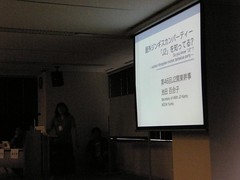

- piro of clearcode, the famed developer of about 25 add-ons, advocated for building unit tests into add-ons. Unit tests may be hard to write and difficult to maintain, though, so piro wrote UnitTest.XUL (abbreviated UxU) which offers a framework to make the unit testing task less painful. He then mentioned some successful uses of UxU.

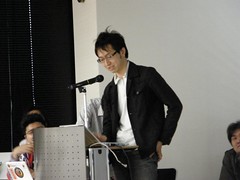
- dynamis of Mozilla Japan presented 10 ways to enjoy open source software: [slides]
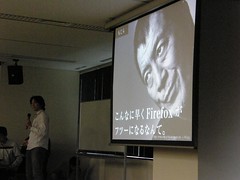
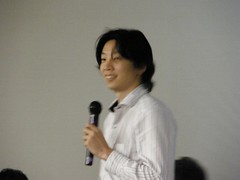
- use it,
- talk about it,
- support other users,
- document and translate,
- test it, report it,
- suggest new features,
- design, illustrate, and mock up,
- write add-ons,
- develop: “bugs are waiting for you,”
- embed it into your projects.
- potappo gave an update on the Mozilla Developer Center Japanese translation. He introduced MDC, described the ramifications of the move from MediaWiki to DekiWiki, and made a call for contributors. [slides]
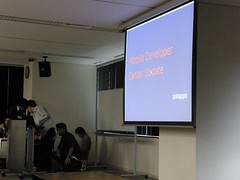
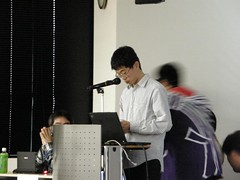
- Taro Matsuzawa (btm), head of Mozilla-gumi, gave a quick overview of his Mozilla hacking experience (including definitive proof that it helped him lose weight). He’s now more involved with community development, including running the regular Firefox Extension Development meetings in Tokyo. He would now like to help support people interested in hacking the core of Mozilla itself and hopes to dragoon more people into doing so.
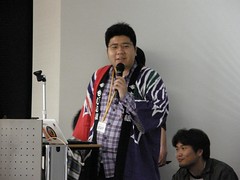
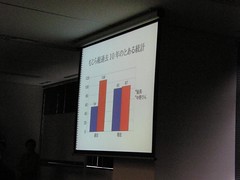
- Masahisa Kamataki from the Japan Open Office User Group showed off the add-on (extensions) functionality in Open Office. He first covered some news, including UNESCO’s promotion of Open Office and the promise of further interoperability with Microsoft Office in the future. He then introduced three Open Office add-ons: the Sun Report Builder, Sun PDF Import beta, and Sun Wiki Publisher. Add-ons can be written in Java and C++, but some do not require any coding.

- Kazuyuki Ashimura of W3C discussed the multimodal web which goes beyond HTML + CSS. He described the architecture of MMI and gave a vision for such ubiquitous devices. He noted that the W3C Multimodal Interaction Working Group is currently going through a rechartering process.


- An anonymous presenter presented some ideas for a new issue escalation system for Mozilla. He believes a bugbase could also act as a knowledge base to support users and act as a hub for developers. Some ideas are up on this website. He’d love to get people involved with this mozwiki project, as well as further development of bugzilla-ja. [slides]
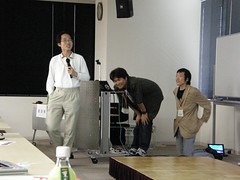
Talk session with Hirotaka Yoshioka and Satoko Takita
The last session of the night was the talk session with Hirotaka Yoshioka of Miracle Linux and the Yokohama Linux Users Group and Takita Satoko (chibi), the Chair of Mozilla Japan, in the style of many Japanese radio talk shows. They stepped through the history of the web and recounted some tales from their experience in the early web. They discussed their struggles for and with internationalization of web technology and their initial reactions to open-source software. They noted that open-source projects used to be used only by those who contributed, but now many open-source projects are used by many who are not active contributors themselves. They discussed the status of various open-source projects in Japan and how they’ve attempted to get people involved.
Yoshioka and Takita finished up by giving their conceptions of the future of the web, as the internet becomes more and more ubiquitous and continues to change the way we live our lives. The internet will continue to develop and transform, and its continued creative development is best spurred through open and free development.
After the party there’s the afterparty
And with that, Mozilla Party JP 10 came to a close and the participants moved to the afterparty. I personally wasn’t able to make it, but makoto has some photos of the great food and various shenanigans up on his flickr.
Thanks to Mozilla gumi and the various sponsors for putting on such an outstanding event! It was great to feel the overwhelming energy of the Mozilla community here in Tokyo.
